

Tiny but mighty
By Teri CadeauWendy Berg, of West Duluth, calls hers the “Caring Corner Cube.”
Russ Salgy at the Valley Youth Center in Spirit Valley refers to theirs as the “Sharing Shelves.”
Delaney Kreager says the one she installed outside Ruth House in Superior is the “Little Free Pantry.”
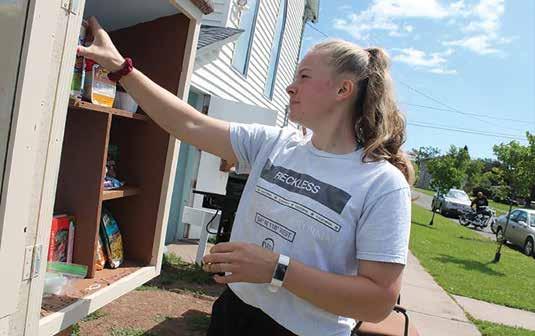
No matter what they’re called, the goal is the same: to care for those in need in the community through free outdoor pantries filled with food and other necessary supplies. Much like the “Little Free Libraries” that have grown in popularity over the past decade, these small pantries have popped up around the Twin Ports in recent years.
The inspiration for these pantries seems to lie in social media. That’s where Berg saw the idea first five years ago. She shared it with her friends and a year later, when Facebook showed her the post in her “memories” feed, she decided it was time to set up one of her own outside her house at 1127 N. Central Ave.
Continued on page 4
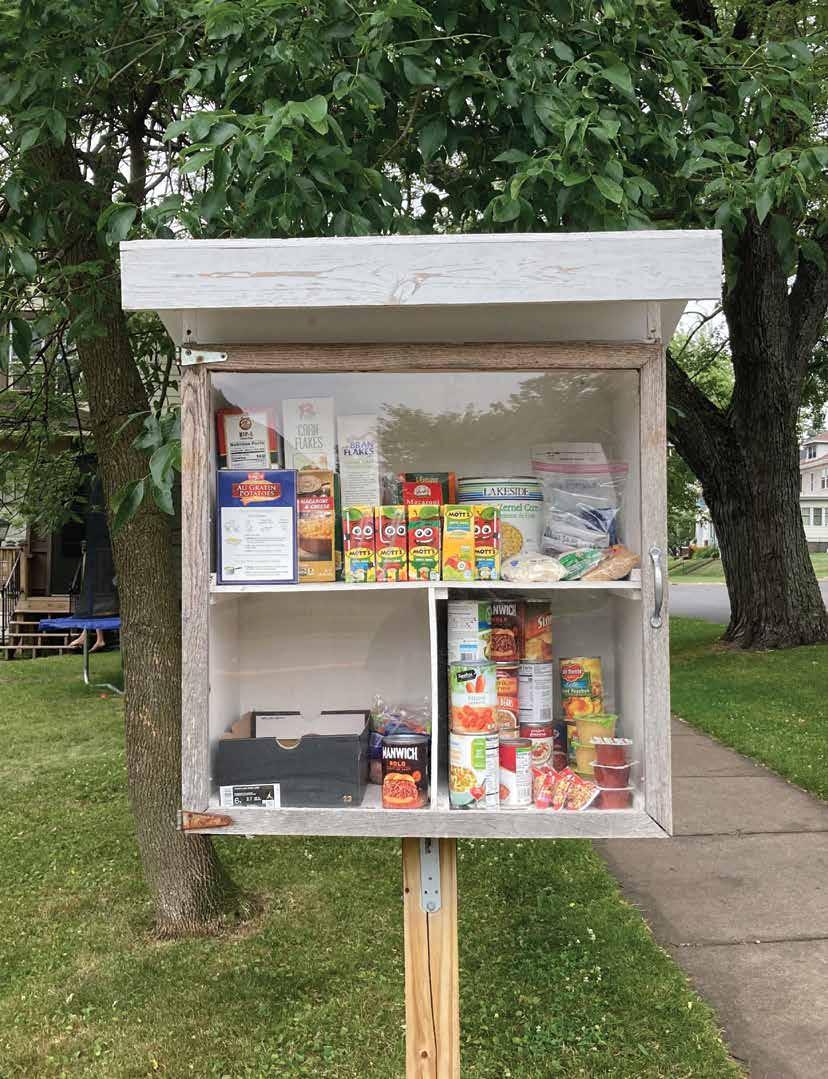
“My husband built it for me,” Berg said. “And it’s been so awesome over these years and gotten so much use that we’ll actually have to take it down this fall to repair it.”
When they pull it in for maintenance, Berg said they’ll continue to have a box out on the corner so there’s still a place for people to place or take donations. She said the pantry sees a lot of use, especially around Christmas and near the start of the school year.
“Which makes me happy, as my whole goal when I was setting this up was to help out families and kids in need,” Berg said. “I was working for a school at the time and I knew there were a lot of kids who only got food at school. So I wanted to help make sure kids could get fed at night.”
Helping out schoolage children was also a motivation between the Sharing Shelves at the Valley Youth Center, not too far away from Berg’s pantry on the corner of Central Avenue and Cody Street. Salgy said the idea came from the center’s AmeriCorps members working at the site. For their Youth Global Service Day, they helped put up the shelves about five years ago.
“Since then, it’s been very busy,” Salgy said. “Typically, if you put something in there around 9 a.m., it will be gone by 3 p.m. Someone will find a use for it.”
While the pantry has a steady supply of canned goods and other nonperishable food, Salgy said school supplies also disappear quickly.
“It’s a pretty high foot traffic and highneed area,” Salgy said. “A lot of kids walk past there on their way to or from school, so they’re able to pick things up as they need them.”
Overall, Salgy said he’s appreciated seeing more of the pantries pop up.
“I think they’re an asset to our community. I think it shows the level of care in our community for each one of our neighbors,” Salgy said.
That was also Kreager’s goal when she set up the Little Free Pantry last year outside Ruth House, 632 Grand Ave., in Superior. The pantry was Kreager’s senior project prior to graduation at Marshall School. She said she was inspired by her father’s volunteer work with Ruby’s Pantry.
“He’s the coordinator of the one at the Coppertop church (First United Methodist Church),” Kreager said. “I’d go with him. At the end of the night, they’d often have extra food left over, so we’d bring it to shelters in the area. I thought it would be cool to bring it to a Little Free Pantry like this one, so we started to build it.”
Like Berg, Kreager got the idea for the pantry from an Instagram post. She and her father built the pantry with repurposed supplies from house projects and she received a grant from Thrivent Financial for the handle and first round of supplies.
Now a student at Lake Superior College, Kreager said she returns to the pantry once a month or so to see how it’s progressing. Every time she visits, she said she brings different items, such as feminine hygiene products.
“Those tend to go really fast,” she said. “It’s something that people might not always think about donating, but I’m sure people are really grateful for when they find them.” u
“I think they’re an asset to our community. I think it shows the level of care in our community for each one of our neighbors,” Salgy said.”
Rick Lubbers
Much has been spoken, written and opined about the wonders of “gratitude.”
It’s a word with a lot of power behind it. A noun that propels many verbs.
Author Melody Beattie recognized that and wrote,“Gratitude makes sense of our past, brings peace for today, and creates a vision for tomorrow.”
Hopefully the stories you read in this issue of DNT Extra will provide just that — sense, peace and vision. Those qualities are certainly evident among the people and organizations in these stories.
The News Tribune newsroom is honored to tell the stories of these remarkable people and organizations who work tirelessly to make the Northland a better place for all of us. Often their work takes place behind the scenes and without much fanfare. They cheerfully help others, not for accolades, but to improve the lives of their neighbors.
This edition of DNT Extra is one small way to share their positive impacts with you.
We hope you enjoy reading about them.
Thank you for being a loyal Duluth News Tribune reader.
Rick Lubbers is the executive editor of the Duluth News Tribune. Contact him at 218-723-5301 or rlubbers@duluthnews.com.

2-4
6-9 10-11 12-13 14-15
16-17
18-21
22-25
26-27
Tiny but mighty
Living Lyle’s legacy
Haglin retires from Northland Foundation
Zeitgeist team lins Duluth’s Hillside with vaccines
Men as Peacemakers charges toward liberation
From ‘destroyer’ to ‘builder’
From idealism to pragmatism
Center for Changings Lives lives up to its name ‘Active living is good living’
Cover: Stock photos
Cover designed by: Gary Meader / gmeader@duluthnews.com
Living Lyle’s legacy
By Melinda Lavine Duluth News TribuneIt’s warm in Trish Northey’s sun room, not in temperature — it’s something else.
Daylight peers in from several windows, the wood-paneled walls are stained a rich cream. There are plaques and pictures of her husband, Lyle Northey, and a sign that reads “Love, Friends, Sunshine and God welcome here.”
Trish Northey points to a clear case on the wall. “Every golf ball on there is a course we golfed. He keeps changing them,” she says, before she remembers.
“When he was here, he’d take one out and put another one in. The center one is Two Harbors.”
Lyle Northey died March 25, and in a way, the case symbolizes how he lived his life — with Two Harbors at the center, surrounded by loved ones, the sunshine and his faith.
Lyle Northey moved to Two Harbors in 1960 to coach and teach for a year. He later became the school principal and the superintendent. He was the mayor (twice), a city councilor, a school district lobbyist, a baseball coach and a lay pastor.
He reimagined the Salvation Army Red Kettle campaign, he organized park cleanups, he started the Two Harbors Area Fund, he found rides for veterans.
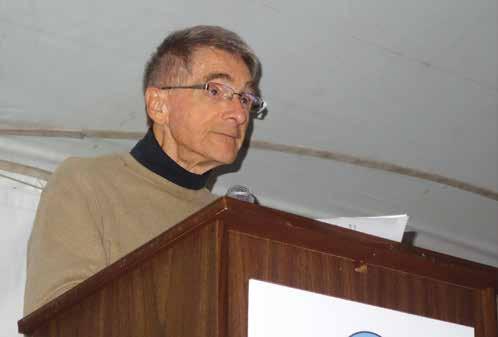
He was a North Shore Rotary member, and a multiple citizen of the year recipient. And that’s just the tip of the iceberg.
“It’s just an hour here and an hour there,” Lyle Northey said in a 2012 News Tribune story. “Someone has to deliver the meals to people who can’t get out and someone has to drive the cancer patient to treatment. To you it’s just an hour, but for that hour you are the most important person in another person’s life.”
It’s clear in the wake of his passing that his impact surpasses titles or awards.
“Lyle was a friend to anyone who needed one, always smiling, always so very kind,” Two Harbors City Clerk Patricia Nordean said by email.
On Facebook, Mary Ellen Scherzer wrote: “Mr. Northey was my all-time favorite teacher and I thank him for all he taught me about English and LIFE. Frolic with the angels, Mr. N!!”
Added Desiree Lee: “One of my favorite people!! He was so kind and caring! He always encouraged me to work hard for what I wanted.”
He was an effective mediator and team builder, Two Harbors Mayor Chris Swanson said.
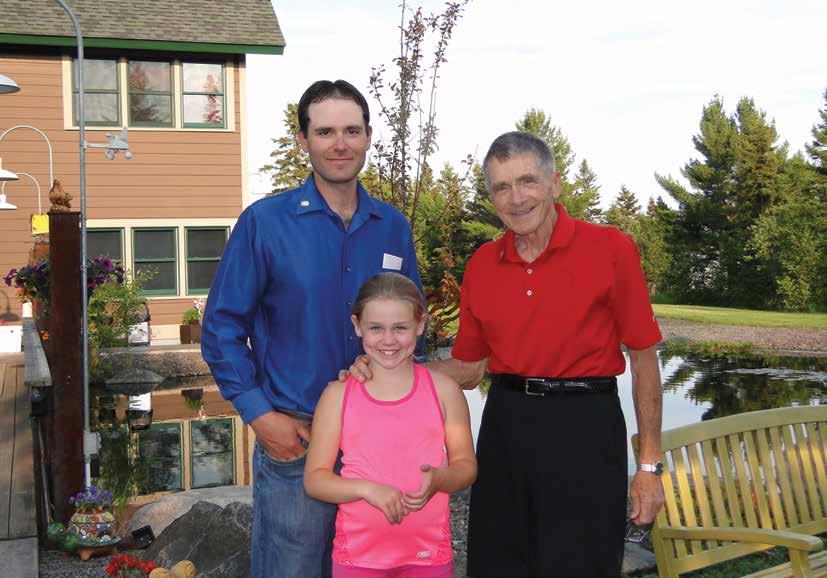
“One time, we were talking about a specific project in Two Harbors and I was asking why we hadn’t achieved getting the project done. He smiled at me and said ‘time out’ and he shared one of the approaches that can really help people come together is to ask a question in a different way. It doesn’t come across so in your face.
“I still use that today and it has helped me tremendously in many situations,” Swanson said via email.
Sitting in their Two Harbors living room, his loved ones painted a full picture of the man.
Continued on page 8
The time he served detention for his daughter, Nadine Northey, when she was late after daylight saving time and “somehow I decided it was Dad’s fault,” she recalled.
How he’d stop whatever he was doing to give his daughter, Cheryl Oling, a hug in his office before school each morning. How instead of raising money for a new church organ, he’d fundraise for its individual keys, recalled Shawn Northey.
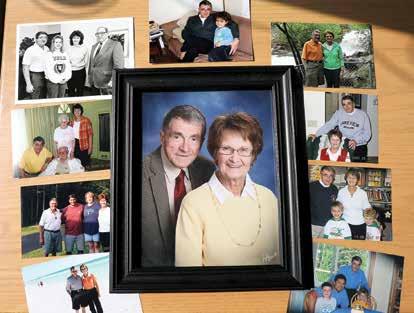
They talked of Lyle Northey’s gifts and limitations, of which he and his loved ones were abundantly aware. (That time when frisbees and a
ladder equaled a hospital visit.)
“As inept as maybe he was in his abilities to fix and do construction, it was quite the opposite when it came to a person,” John Wojciuk said.
“He could help you and, for lack of a better word, fix you and make you feel cared for in a way that you could never feel with anyone else. And, he did that not only with us, but with his baseball players, people he coached and that’s what I miss,” Wojciuk continued.
Though, before he helped others, Lyle Northey accepted help himself. He struggled with alcohol addiction in the late 1970s.
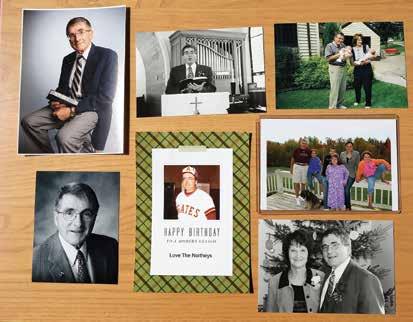
“For me, it was hard to recognize,” Nadine Northey said. “Work was always very important to him, so, that — at least for a long time — hadn’t suffered.”
When things got bad, they also got public, and he declared bankruptcy in 1980, which became front-page news, Northey recalled.
It was a time when he felt everything closing in, she said, but, through his despair, he was motivated by three words written on pieces of paper. “That was Dad’s reason for going on, for continuing at that time. It was just Shawn, and I and Lance,” she said.
After a family intervention, Lyle Northey committed to recovery. He went to in-patient treatment at Miller Dwan. He relied on support in his counselor and in his pastor. He built a relationship with a higher power.
“There was a lot of suffering and a lot of pain, and it was very public and affected a lot of people in the community, but he bore through it all. He carried it all and healed and then used that to help him make things better for so many,” Nadine Northey added.
Today, Northey sees how this helped her father uncover his true self and improve the lives of others. “The person was always there, it was just clouded,” she said.
Lyle Northey was transparent about his past and his recovery in his community work, particularly with his mayoral race, recalled his son, Shawn Northey. “It wasn’t, ‘I’m going to hide this.’ I’m going to put it out there, you make your decision,’” he said.
He had a good vision and a plan for Two Harbors, and people really needed that, said his son,
When Trish entered his life, their strengths and limitations, interests and values, made a match. “Is it safe to say he was the only 70-, 80-year-old on an allowance?” Shawn Northey said with a laugh.
“He admits to this day, he can do investments, he can do financial things, but he can’t do the everyday stuff. It just throws him off,” Trish Northey said.
The family talked, through laughter and tears, about having enough educators and administrators in the family to start their own school. The many, many retirement parties from his jobs and volunteer commitments. His power naps, book obsession and impromptu weekends to recharge.
His death still feels surreal, said Wojciuk, who feels like he’s going to spot his father on the golf course or at the bookstore.
“He was the glue,” said Cheryl Oling, but the family is sticking close despite his absence — a fact he’d like.

“It’s day to day for me,” Trish Northey said. The grief is manageable until she comes home to an empty house or makes a meal for one. She still feels a presence of him.
“Now, I load the dishwasher any way I want to, and I say, ‘Lyle, you’re not going to say anything,’” Northey said. “That was our only issue.”
Nadine Northey feels she can connect with him more easily now.
“I feel like he’s always accessible,” she said. Asked about his legacy and how that lives on, his family had many thoughts.
His healing listening skills, his unending well of care for others, these are traits that his five children and his 13 grandchildren try to model in their own ways.
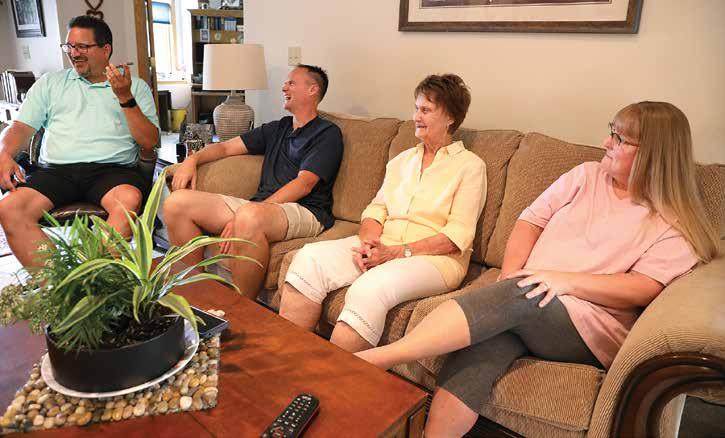
“That he was ‘almost perfect,’” Shawn Northey said, quoting a saying from his father.
“When asked, ‘Why do you do this?’” John Wojciuk recalled, “He’d say ‘Why not?’” u
Haglin retires from Northland Foundation
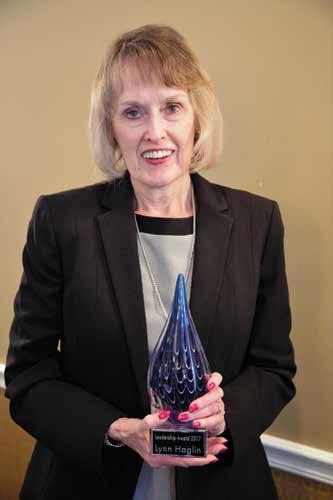 By Laura Butterbrodt Duluth News Tribune
By Laura Butterbrodt Duluth News Tribune
Passionate. Caring. Thoughtful. Positive. Humble. Patient. Leader. Friend.
When people who know Lynn Haglin are asked to describe her, these words are repeated many times. After spending the last 29 years at the Northland Foundation as Kids Plus director, plus serving as vice president of the foundation for almost 25 years, Haglin retired July 1.
“My heart has been in this work, next to my family. My work is not just a job — it’s also my hobby,” Haglin said. “I’ve felt very fortunate to have this position over the years. It’s been a wonderful journey.”
In her nearly three decades of service to the Northland and the state of Minnesota, Haglin led the creation of 57 community-based coalitions for Kids Plus, Age to Age, Early Childhood Coalitions and the Duluth/Proctor/Hermantown Thrive Initiative. She also helped raise and administer $36 million to support and sustain community programs, plus leveraged an additional $60 million.
Haglin joined the Northland Foundation after teaching kindergarten and early childhood education, as well as working for the Duluth area’s Early Childhood Family Education program. She planned to become a principal or superintendent after raising her three sons with her husband, Reid. But when she attended the interview for the Kids Plus job, she said she immediately knew it was the job for her because it combined all of her skills, despite its requirements for long days of work and travel across the Northland’s seven Minnesota counties.
“I always felt like children were just at the heart of everything and we have to make sure that they get that good chance in life,” she said. “They need to get that good start and be supported. Every single child is
valuable and matters, and that’s where my heart and focus has been all of the time.”
She helped introduce Kids Plus programming into 26 communities around the region by talking with people and hearing what the community needed. She wanted to introduce safe and healthy activities that could prevent children from facing challenges.
Tony Sertich, president of the Northland Foundation, said Haglin was one of the first people to advocate for children’s social, emotional and mental health. He credits her as the engine that brought these topics to the importance they’re regarded with today.
“She brings advocacy for the youngest of us, but then also for our region to make sure that these programs and policies work,” Sertich said. “We’ve been so fortunate to have worked with her because she has made this one of her life missions, to be a voice for groups who historically haven’t had a strong voice.”
When developing the community initiatives, Haglin wanted the programs to adapt over time as the communities’ needs changed. Some of those adaptations became separate initiatives, including the Age to Age initiative to connect youth, adults and elders in communities. She also spearheaded the volunteer Youth in Philanthropy program and the Youth Leadership Academy to empower ninth graders to get involved.
Zane Bail, chief operating officer of the Northland Foundation and longtime co-worker with Haglin, said her ability to form and keep relationships helped connect communities and organizations.
“When an opportunity comes up and Lynn puts out the call, everybody says ‘yes,’” Bail said.
Haglin heard area coordinators say they wanted more collaboration. Not only did she incorporate regular meetings with coordinators and bring Kids Plus programs together, but also Bail said the collaboration aspect is now incorporated into all of the Northland Foundation’s work to help share information and ideas across networks.
The director of the McGregor Kids Plus program, Cheryl Meld, started with the program close to the same time as Haglin. She said Haglin’s positive energy surrounding the job and her encouragement to stick with good ideas is part of what has kept Meld with Kids Plus all this time.
“We’ve got many students who now are doing
amazing things because Lynn had the insight to make kids the focus and let them do the leadership,” Meld said.
Haglin said helping thousands of children learn that they have the power to be a leader has been one of her strongest driving forces. She remembers fondly all of the conferences Kids Plus participants were able to attend, where many children had their first opportunity to go to a nice dinner and hear from national speakers about youth leadership.
“The key is reaching out to young people that are the harder ones to find — the ones that are not already leading student council, are not already engaged in a million different things,” Haglin said. “It’s really about helping every young person figure out they have skills, talents and abilities that they can offer to the community and that they have leadership skills, they’re just not aware of it. Somebody’s got to encourage them and that’s what we do.”
Haglin has also been a leader for childhood development across the state of Minnesota, including helping develop the Parent Aware child care database and the Minnesota Early Childhood Initiative. She also attended national conferences where she, Bail and RaeJean Hansen, vice president of the Early Childhood Southern Minnesota Initiative Foundation, presented Minnesota programming as an example for other states to follow.
“She can listen and hear questions and concerns and answer them in a way that is very thoughtful and respectful, yet give a lot of really good, concrete information in a way that everybody can understand,” Hansen said.
Haglin has received several honors over the years, including the “Light a Candle” award from the Center for Early Education and Development, the Northland Newscenter Women in Leadership Award, and The Woman Today “Rosie” Leadership Award.
Haglin plans to spend her newly freed time with her family, and especially looks forward to seeing her seven grandchildren more often. She will continue to work part time for the Northland Foundation, where she will continue to build and sustain programs supporting communities. She will also continue to serve on Gov. Tim Walz’s Children’s Cabinet Advisory Council and the state’s Preschool Development Grant subcommittee. u
Zeitgeist team links Duluth’s Hillside with vaccines
By Andee Erickson Duluth News Tribune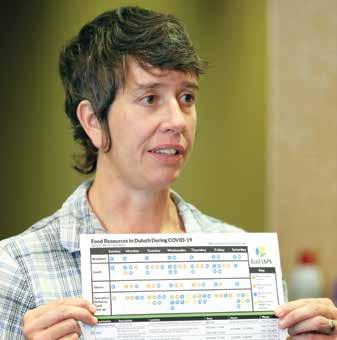
Around the time that COVID-19 vaccines started rolling out, nonprofit community development organization Zeitgeist formed a team of people with diverse connections to help connect Duluth’s Hillside residents with vaccine resources.
Andrea Crouse, the community development manager at Zeitgeist, is the facilitator of the Healthy Hillside Steering Team made up of seven people, each dedicating between five and 10 hours a week to assessing and addressing the needs of the community.
“The Healthy Hillside leadership team is so inspirational to work with,” Crouse said. “When they were hired, every single one of these individuals was already doing this kind of work in some way in the community. They just weren’t getting paid for it. They were seeing needs and challenges faced by either themselves or their neighbors or their family and they were looking for solutions.”
Zeitgeist, a nonprofit located in downtown Duluth that’s more than just a restaurant and theater, has engaged in community development work for years. When the pandemic hit, the nonprofit saw how it was uniquely affecting Duluth’s most diverse neighborhood where there are higher rates of unemployment, poverty and people without health insurance, and they saw an opportunity to address.
The Healthy Hillside team hosted a vaccine clinic with Essentia Health in March at the Gloria Dei Church. Ahead of the event, they posted flyers, got the word out at various organizations and set up a phone line with Essentia to help register people. The clinic vaccinated 146 people, 100% of whom came back for their second dose in April.
“I would say a big reason for that is because of the care the team put into it,” Crouse said. “We’ve had individual conversations with over 7,000 people about vaccinations and health care. So we’re building these relationships in a broad way, but it still comes down to the individual.”
Using CARES Act funding from the city and a grant from the Centers for Disease Control and Prevention Foundation to address vaccine hesitancy, Zeitgeist is paying the steering team to reach people where they’re at.
Tiffany Fenner was already doing that through various volunteer work before the Healthy Hillside job opportunity presented itself. Every other Saturday morning she would hand out coffee to people outside the Damiano Center.
Now she’s using the trust she’s built with people to answer questions about vaccines and help them make plans to get vaccinated if they’re interested.
“I really just want to help build this community up and this is a community my children live in. It’s important to me that it’s safe,” Fenner said. “Sometimes a smile is all somebody needs to brighten up their day, and so if I can be that person,
I want to do what I can. It makes me happy to help other people and so that’s what I do. My kids are out there helping and that’s really what my kids want to do.”
In late July, the team began its first canvassing effort with the goal of knocking on the doors of 500 homes in the Hillside to support anyone who still has questions about vaccines or isn’t sure how to make an appointment. The group will also link people with whatever other resources they need, from food to transportation.
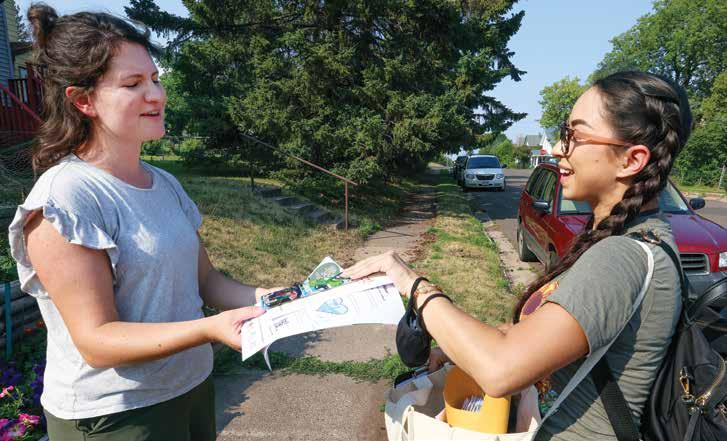
Fenner wants people to know there’s an entire community out there happy to help them. She wants to make sure those who aren’t typically paying attention to the news or who don’t have access to health care aren’t left behind.
“I think that’s important, especially during a pandemic when people don’t know what’s going on,” Fenner said. “So it’s important to have a friendly face out there.”
She hopes the effort will reveal that there’s enough interest out there in vaccines to warrant another neighborhood clinic. u
Men as Peacemakers charges toward liberation
 By Andee Erickson
Duluth News Tribune
By Andee Erickson
Duluth News Tribune
The youth in Duluth’s public schools who self-select to join Men as Peacemaker’s youth restorative program forgo their recess time to explore healthy masculinity with Serrano Robinson.
“The kids bring each other,” Robinson said. “You can tell how much it means to them. They’ll come in, literally, with five extra people the next day and I’m like, ‘Hold on. Let me write down your names.’ They just love it. They love being supported. They love being in a group where they can be them and they can grow.”
All the programs, for youth up to elders, that run through Men as Peacemakers — a Duluth nonprofit aimed toward liberation and preventing violence to women and children — are filtered through the belief that everyone is connected, and the programs are born from needs identified by the community.
In the youth groups, Robinson facilitates discussions and activities rooted in learning life-building skills such as conflict-resolution, emotional awareness in themselves and others, leadership, self-worth and accountability.
Robinson believes in young people and knows first hand what it’s like to grow up without a support system.
“Youth need support in general,” he said. “It’s
helping the youth grow into their leadership, grow into who they are, while also challenging the toxic masculinity that comes from the community. When you think about children, most of what they talk about is what they learn. If a 10-year-old can tell you right in your face that he has heard that Black people are not important, then we have to access that and we have to talk about that.”
There’s no “life class” in schools, Robinson said. No classes that coach kids through their worries. That’s why his favorite part of the program is youthled conversations. If the kids have something on their mind they want to talk about, the program drops its plan for the day to discuss that.
The program serves four schools: Laura MacArthur Elementary School, Piedmont Elementary School and Lincoln Park Middle School — all during lunch — and Myers-Wilkins Elementary School after school. Activity-based programming is also offered in the summer.
While Robinson makes ample space for kids to have fun, he also sets a stern standard of discipline and respect.
“I believe discipline falls under the lines of love, because we can’t just allow each other to do anything to each other,” he said. “I think they see we’re providing that authentic love with ‘I actually care about you and I’m not going to allow you to go down.’”
The program can leave a lasting impression on kids, Sarah Curtiss, co-executive director of the nonprofit, said, because they get to know adults in the community, beyond their family and teachers, who love and care about them.

“They’re talking about things most of us didn’t talk about until we were in college, or beyond that,” Curtiss said. “Serrano is such a good example and great representation of a singular program here at MAP.”
The nonprofit is set on creating a world of liberation and joy inside the organization that Curtiss is confident humanity will experience during her lifetime.
She shared a vision she has of herself long after her work in the community is done. She’s sitting in a rocking chair among great-grandbabies, probably wearing the same green streaks in her hair.
In the vision, Curtiss said: “They’re looking at me going, ‘So, Grandma, what did you do for work again? People used to hurt each other like that, Grandma?’ I really honestly believe there’s going
to be a generation of children who are not going to be impacted by violence in the way I was and my mother was and my grandmother was and my greatgrandmother was.”
It’s a radical choice, Curtiss said, to believe humanity will choose something better for itself. As a survivor of violence, she said her optimism is hard-fought.
That pathway forward for her and the organization means standing for a cause instead of standing against everything that gets in its way. It’s everyone asking themselves what gifts they bring to the community.
“How do we collectively decide what we want to stand for in order for everybody to be safe and whole. For everyone to be safe and whole, how are we choosing those conditions?” she asked. “That’s our North Star.”
Curtiss got her start working in the community 19 years ago at the tail end of an era when social justice work was grassroots and wasn’t yet institutionalized.
Although racism and misogyny have always existed in Duluth since colonization, Curtiss said there’s always been a tradition of people wanting better for each other, and the pandemic has accelerated that realization.
“If we start creating this world, there’s going to be so much love that fills up the space, there’s not going to be any room for that (violence),” Curtiss said. “But it’s not the fluffy, cotton candy type of love. It’s wanting people to be their best. I need you to be your best so I can be my best so they can be their best.” u
From ‘destroyer’ to ‘builder’
By Sara Guymon Duluth News TribuneRichard Howell has dedicated his life to helping those in need in the Duluth community. To him, the Duluth community is what pulled him out of his struggles.
Howell described his previous self as a “destroyer” of the community. He was addicted to drugs and was selling them to make a living. However, that all changed after he went to prison, and after he encountered Sgt. Mike Erickson.
“I had a police officer named Mike Erickson that I encountered while I was selling drugs, and like so many other people, he saw something in me that I didn’t see in myself,” Howell said. “(Erickson) told me, ‘Try helping out in the community.’ When I got out of prison, I basically took him up on that offer. And that’s why I wanted to give back.”
Erickson has had such an impact in Howell’s life that Howell even asked him to be on the board of directors for an organization he started a few years ago called Housing for Inmates.
After getting out of prison, Howell became involved with the Damiano Center, where he helped out for about 10 years. The Damiano offers free meals and is home to a free store, among other services. Howell, however, wanted a position where he could really help a person from point A to point Z, so he recently left his job there.
Now, he works with Community Action Duluth, a nonprofit organization dedicated to eliminating poverty. Even though he has only been with the organization for two months, he is striving to make a
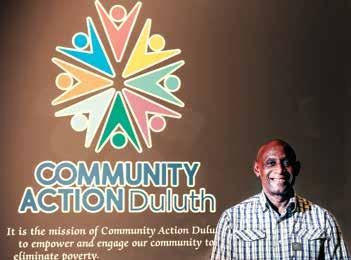
difference.
“(Community Action Duluth) has a new construction program where they train low-income people in construction.” Howell explained. “They have a teacher that trains them and I’m the bridge between the teacher and the students to give them an understanding of what the teacher is trying to explain to them.”
Community Action Duluth offers a variety of services and programs in addition to the one Howell helps out with. They provide help with legal issues, taxes, education and many other services to help people take a step in the right direction.
“I think it’s an honor to be able to give back,” Howell said. “I’m just grateful for these opportunities.”
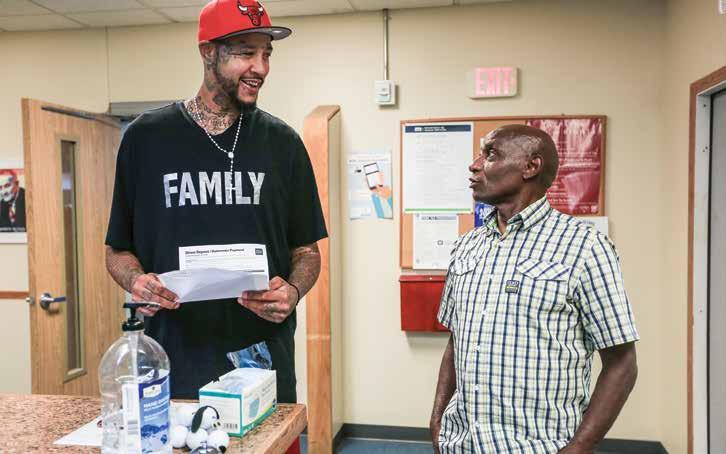
This isn’t where Howell’s services stop, though. He has helped out with just about any organization that would accept him, including AICHO and Life House. He even helped establish a program at the beginning of the pandemic called “Surviving COVID-19.”
It allowed him to be productive during the pandemic by collecting winter clothing for the homeless and delivering warm meals to them.
Howell goes as far as giving rides to warming centers for those who need it.
“I wanted to be something different than a destroyer,” Howell said. “I wanted to be a builder. I wanted to be a provider. I wanted to be someone that can offer something to someone that has less than anyone else.” u
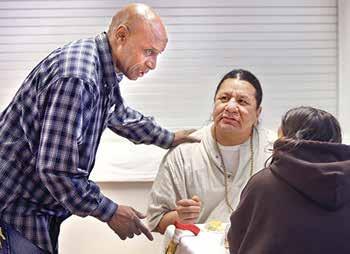
From idealism to pragmatism
After Duluthian Joel Kilgour graduated early from high school, he decided he’d spend a year interning at various places. His first one was at Duluth’s Dorothy Day House with Loaves and Fishes, a Catholic Worker Movement-based shelter for people experiencing homelessness.
“I meant to be there for a summer,” Kilgour said. “And here I am, 27 years later.”
Kilgour, a longtime advocate for Loaves and Fishes, has seen the community surrounding the organization change in that time. He’s seen the number of people experiencing homelessness grow over the years, the establishment of other area shelters and increased collaboration.
By Teri Cadeau Duluth News Tribune
“Throughout, he’s been a steady and calm leader with vision and skills,” said Angie Miller, a founder of Loaves and Fishes. “I admire him greatly and I’m extremely thankful that because of him and Donna (Hursby), Loaves and Fishes continues to ‘comfort the afflicted and afflict the comfortable.’”
Kilgour was born in southern Alberta, Canada, but was raised in Duluth from age 4. He considers himself a “fourth-generation Hillsider, on my mom’s side.” He grew up in a large working-class family and said he started to awaken politically while attending a private school.
“A lot of my teachers and fellow students there were wonderful, but I was confronted pretty quickly with a whole different class reality,” Kilgour said. “Just by the assumptions that a lot of my fellow students made about life. They were really foreign to me and the handful of poorer kids who went there.”
He grew up watching people such as his grandparents care for their communities and had a
sense of empathy instilled in him at a young age. He remembers his grandmother, Phyllis Monsaas, caring for neighborhood children and becoming deeply involved in her community.
“She served as an election judge for several years and she even left hospice during her last year in order to go vote in the election,” Kilgour said. “She and my grandpa were my guiding lights; they’re who I think about when I do this work. I’m not doing anything that my grandparents wouldn’t do for their neighbors.”
As a teenager, Kilgour started to get involved with Loaves and Fishes through its political protests. At the time, the organization was known for its involvement in protests against nuclear weapons and its advocacy for nonviolence.
“A nice way to think of me through my teenage
years was as a wide-eyed idealist,” Kilgour said. “Another way is as an insufferable young activist.”
Miller said she noticed his idealism as a teen, but noted it had changed over the years.
“Over the years, the idealistic side of Joel was tempered by pragmatism,” Miller said. “And he has grown into the person who I believe is mostly responsible, along with Donna Husby, for the fact that the community is still alive and providing a safe place and a welcoming environment for unhoused people.”
During that first summer, Kilgour moved into the Dorothy Day House, where he’s volunteered to help run the house ever since. Dorothy Day is a house for male-identifying people experiencing
Continued on page 20
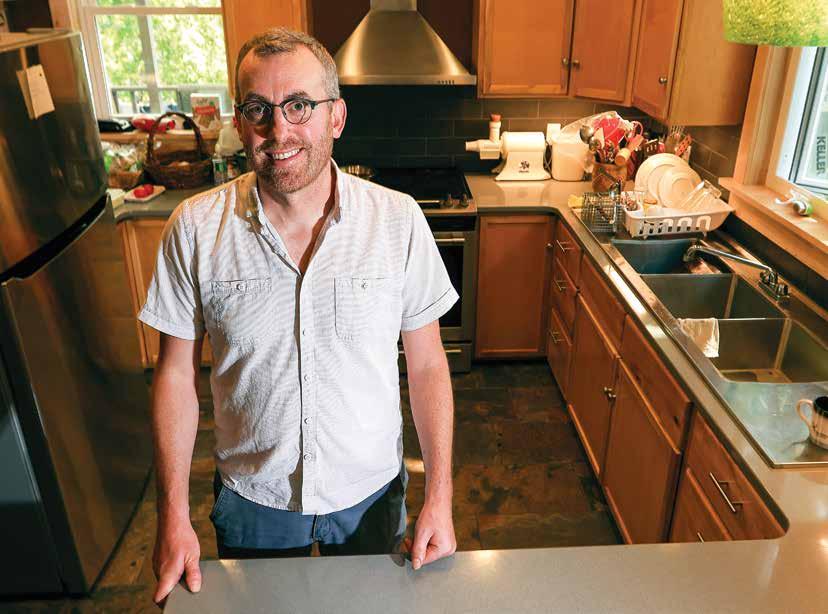
homelessness. He still lives in the same house, in a room which he said has never had a lock.
Over the years, Kilgour said the homeless population has expanded exponentially. Back when he first moved in, he said they never had to turn anyone away.
“We would just make it work and find room on the couch or something,” Kilgour said. “Today,
“I hope the city has second thoughts about kicking us out of here,” Mitchell Hall, of Duluth, said in September 2013. He had been homeless since June 2013 and lived in a tent camp under the freeway, where he considered those people his family. Also pictured are Tom Jarvis, from left, who often lived in the camp; Joel Kilgour, outreach worker for Loaves and Fishes; and Deb Holman, street outreach worker for CHUM. (Bob King / File / News Tribune)
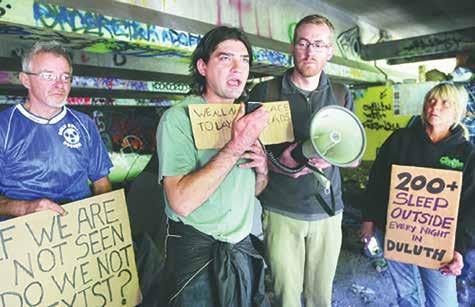
if everybody who is out on the streets came into a shelter, we wouldn’t have the space. Right now, there are over 1,500 households on a priority list for housing. We saw 550 people come through the warming centers this winter, which means at some

point they were unsheltered homeless. We have never seen numbers like that.”
And the length of time people have had to stay at shelters has also increased. Kilgour said the average guest at one of their shelters would be able to find a place to live within a month or two. Today, if an unhoused person is doing everything right, such as working, saving money and applying for every program available to them, they’re still going to have to wait at least six months.
Despite this, Kilgour said he’s also seen some positive changes in his years with the organization. The development of more shelters for domestic assault victims as well as youth under 18 have helped. And the organizations with a stake in combating poverty and providing more housing have started to work together to advocate for their communities.
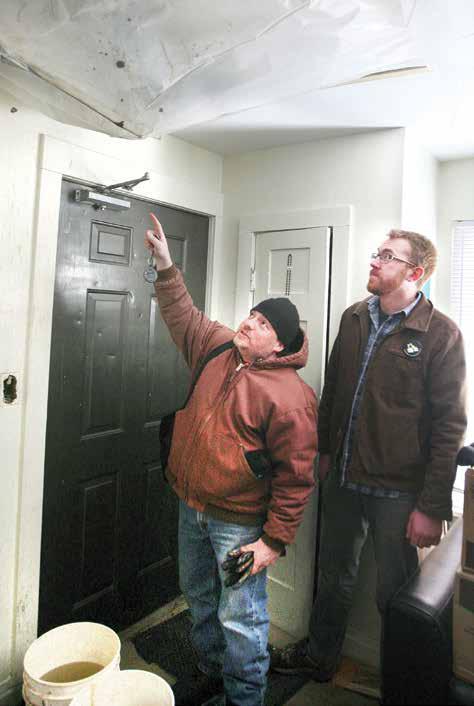
“We have so much more collaboration between agencies in Duluth,” Kilgour said. “We’re able to do so much more together than on our own.”
But the biggest miracle for Kilgour is how the Loaves and Fishes community has continued to grow.
“We have this beautiful network of volunteers and donors around the area who will just step up any minute we ask for things,” Kilgour said. “Loaves and Fishes is a bit of a miracle in that way. We ask people to come and they volunteer. That’s a big commitment.”
His favorite moments are when people who used to stay with them return to provide for those who are staying in the organization’s three houses today.
“I’ve seen people who lived at Olive Branch when they were kids show back up at our door with a donation of food,” Kilgour said. “And they’ll say, ‘I lived here when I was 9. It was a scary time in my life, but you guys made it OK. And I’m doing great so I wanted to support the work you do.’
“How much more beautiful can you get than that?” u
Center for Changing Lives lives up to its name
By Brady SlaterInside the Center for Changing Lives in July, the halls were quiet.
It was early in the morning and the center continues to practice COVID-19 precautions, meaning most of its employees work from home unless they’re providing direct support for the young people up to age 24 who live at the center.
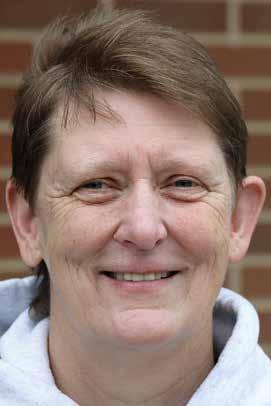
Built by Lutheran Social Services in 2017 for $9.1 million, the facility opened on 1422 E. Superior St. in the East Hillside neighborhood of Duluth, offering a bright new centerpiece for the ages-old problem of youth homelessness.
The Center for Changing Lives says it serves 880 young people annually with its trove of programs.
“We’re really here to help them build the skills and connections they need to be successful in life,” said Kelly Looby, Lutheran Social Services’ program director in youth, children and family services.
Looby guided the News Tribune on a tour of the Center for Changing Lives, which is defined by its second- and third-floor living areas. On the second floor are 10 apartments of permanent supportive housing, and, on the third, 10 rooms around a central living space and kitchen for transitional housing.
Both programs are filled. Transitional housing takes people for up to 18 months, while permanent supportive housing lasts longer than that, and encounters people experiencing more difficult situations. A lot of the time prior to landing in the Center for Changing Lives, the young people have been couch hopping, or living in a vehicle or tent.
“This could be the first time they’ve ever had a
home,” Looby said, explaining that transitional housing is for young people with lower barriers to success.
A lot of the young people at the center have jobs, she said. There’s on-site behavioral health support, and even laundry rooms — emblematic of the wholescale approach.
“Our approach is a wraparound-of-services approach,” Looby said. “It’s helpful because there’s so many things happening out of one location.”
Services come with case management attached, helping young people connect to addiction services, food security, educational goals, income and employment opportunities and medical assistance.
“We’re here to help them get hooked up with all of the resources they need,” Looby said.
Among the host of programs offered by the Center for Changing Lives:
• Oh No! 18: prepares young people aging out of foster care into independent lives.
• Crisis Nursery: short-term care for infants through 12 years old for parents who are
experiencing a housing crisis.
• Runaway and Homeless Youth Program: guides youth to safe housing options and resources.
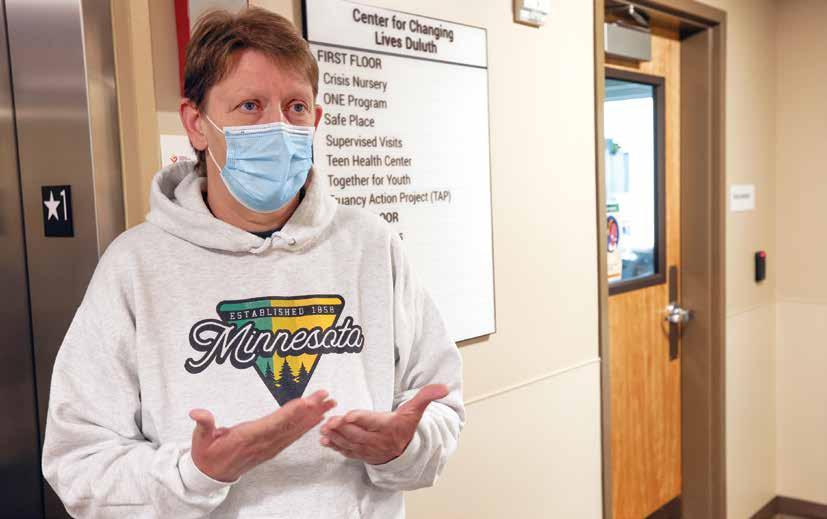
• Supervised visitation: offering supervised parenting time.
• Teen Closet: offering new and gently used clothing.
• Together for Youth: supporting LGBTQI+ youth.
• Truancy Action Project: Connecting area schools to reach youth by removing barriers to attendance.
The Center for Changing Lives is a secure facility. Young people connect to it through the 211 coordinated entry phone system, or by encountering Lutheran Social Services’ youth shelter, Another Door, located downtown by Duluth Bethel.
“We can provide a continuum of services if we see youth at Another Door,” Looby said.
One of the benefits of Lutheran Social Services’ full-spectrum approach to addressing homelessness in young people: The people experiencing hard
times don’t have to retell their stories over and over again.

“You’re trying to work through that, and to expose yourself to it one more time causes trauma,” Looby said. “By having youth work with the same staff across programming, you don’t have to do that.” u
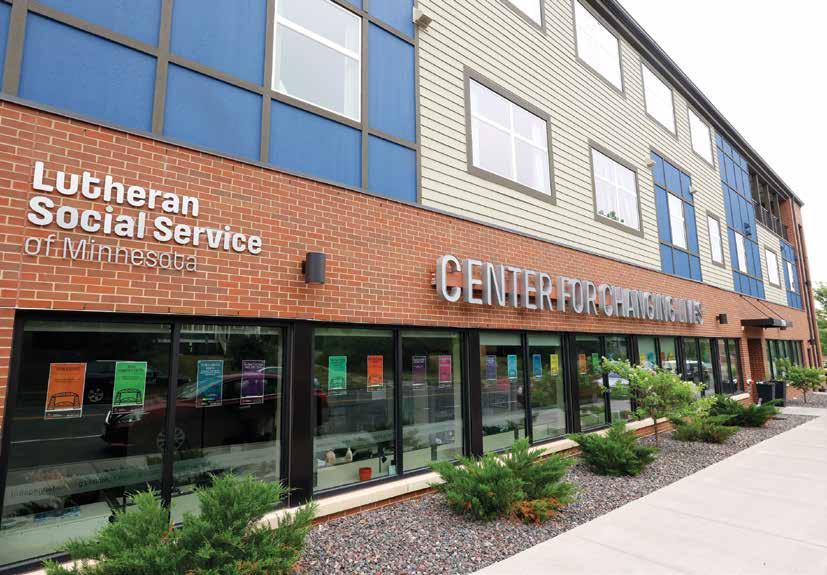
A flier in the hall by apartments in the Center for Changing Lives tells tenants how to seek help paying rent if they need it. (Steve Kuchera / skuchera@duluthnews.com)



‘Active living is good living’
For 27 years, Eric Larson has dedicated his practice to helping people with disabilities.
By Sara Guymon Duluth News TribuneAfter being introduced to the area on vacation at age 13, Larson has loved all of the recreational activities to do. From cycling to canoeing, he found a passion for the outdoors and a love for northern Minnesota.
Larson received a degree in therapeutic recreation from Indiana University. He was encouraged to go into this field after meeting the first therapeutic recreation specialist in Minnesota. After deciding to focus his schooling around it, Larson went on to do an internship at the Essentia Health-Polinsky Medical Rehabilitation Center. After that, he never left the community.
Currently, he is the coordinator and supervisor for the adaptive recreation program at the Courage Kenny Rehabilitation Center. He works directly with volunteers and the community to find ways for people with disabilities to be involved in recreational activities.
“I believe wholeheartedly that active living is good living, and it’s important for everybody to have some form of an outlet for physical activity,” Larson said.

The program partners with recreational spots in Duluth, such as golf courses and Spirit Mountain. They work together to modify their activities into something functionable for a specific person’s needs. These things could include modifying a bike so that it can be pedaled with arms instead of legs, or modifying a kayaking paddle.
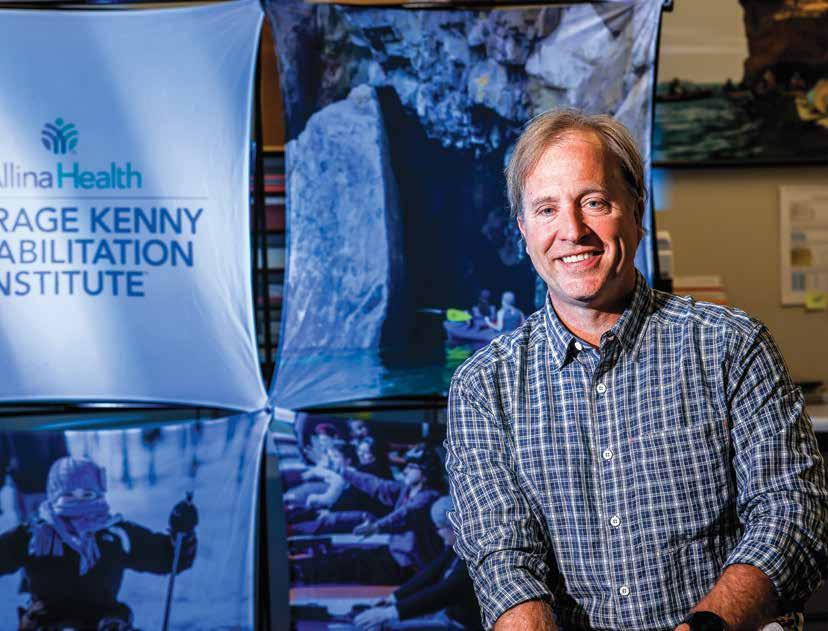
“It really is an ongoing kind of partnership with our community,” Larson said. “By partnering with Courage Kenny, they are learning a little bit about the need and the kind of the mechanics necessary for people with disabilities to participate in activities.”
The adaptive recreation program functions primarily with local volunteers. There are about
350 volunteers with only two full-time employees involved across Northeastern Minnesota and Northwestern Wisconsin.
The participants of the program range from age 5 all the way to people in their 90s. The disabilities also range from cerebral palsy and autism to knee replacements.
“I really do get a great amount of satisfaction when I see people really self-actualize and start to reshape their paradigm around what they can do,” said Larson. “The end result of all the other work is super rewarding.” u


